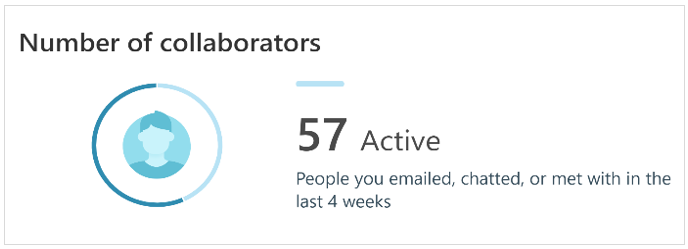Sometimes, solutions to workplace challenges like performance management and employee development arise from unexpected places.
A few weeks ago, I started receiving emails from Microsoft called “My Analytics.” Have you seen these?
Microsoft is tracking my digital behaviors and creating a report designed to help me understand my work habits and give me helpful suggestions. For example, the My Analytics report told me that I open my emails, on average, 30 seconds after I receive them. Based on that data, it suggested that I answer email only 2 or 3 times each day to avoid being continually distracted from my projects.
Smart, right?
Here’s another example; the most recent My Analytics report I received told me I’ve had 57 performance reviews in the last 4 weeks.

Actually, as you can see the report told me I had 57 active “collaborators” not 57 “performance reviews.” According to the report, collaborators are people that I have emailed, chatted or met with in the last four weeks. Consider what that means…
It means I have discussed ideas, identified problems and solved issues with 57 people.
It means I have either met or failed to meet the expectations of 57 people.
It means that 57 people now have an evidence-based opinion on my performance…whether they’re responsible for writing a review of me or not. Some collaborators will certainly have more evidence than others, but I’m making an impact and the waves are rippling across the paths of 57 other people.
If you adopt the simple philosophy that your performance is being reviewed every day, you become more eager to make your learnings greater than your experiences and begin to recognize that the past is only valuable if it informs the future. When this “365 approach” to performance management is applied within a business the “performance reviews” that focused primarily on the past are replaced with regular performance discussions where employees transform their experiences into strategies that will help them create better results in the future.
Here are 4 elements to improve performance management and employee development:
Focus on results and their impact.
Ask employees to consider the results they’ve achieved, what’s meeting expectations and what’s not. Have employees discuss this with their leaders on a regular basis. This eliminates surprises and creates clarity for both parties. Have the employee consider the projects they’ve been given as well as other results, such as how they’ve exhibited the company values. Then, ask the employee to evaluate the impact of their work. What worked? Where did you meet expectations? How did that impact our team? Our customers?
Loop in other voices.
What would the 57 collaborators I’ve worked with say about my performance? How could knowing that help me improve? Ask employees to gather feedback from people they work with. What do their peers, other supervisors or direct reports have to say? Teach employees to give and receive feedback that tells what’s working as well as what could change or improve for better results.
Have individuals identify their own learnings.
Ask employees to consider their results and determine what they can do differently next time and what strategies they can put in place to produce better outcomes in the future. How can you capitalize on success? What did that setback teach you? What will you change to create a better result in next time?
Focus on the future.
Ask employees to decide what needs to happen in the next 12 months for them to say it was a successful year. What are their personal and professional goals? What needs to happen on their team? Discuss their vision of the future and teach supervisors to help align employee aspirations with the strategic goals and needs of the company.
Performance management and employee development
We’re all being reviewed every day, so embrace the idea that each day presents an opportunity to improve performance management and employee development. Get better each day by making the learning greater than the experience. Ask employees to regularly capture their learnings and transform them into strategies. Change your organization with a 365 approach to performance management and employee development.

